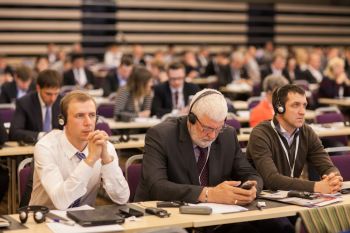Such have been the forecasts of e-commerce experts made today at the international conference eCom21 held in Riga .

During the first day of the conference, representatives of global payment systems, state regulators, big legal and audit companies and other experts of the e-commerce market made their reports.
As the VISA Manager in the Region of Finland and the Baltic countries Vesa Tukonen noted in his report, the growing opportunities and comfort provided by modern technologies, alongside the changes in consumer psychology, contribute to the rapid development of the online environment. This business is becoming increasingly more attractive for investments on a global basis. New types of payments are appearing – some of these innovations become more successful, others less, but the trend towards development in this direction is obvious. All of these provide new opportunities for sales and exert a growing impact on the retail industry. According to the forecasts of Mr Tukonen, in store e-commerce will also be increasingly used by traditional “physical” stores in the future.
“The behaviour of consumers, business models and types of payments are changing – we see the obvious competition in this environment. In comparison with the traditional offline environment, it is a real revolution. As to the online business, it means speed, convenience, big choice and safety,” emphasised the VISA expert.
In turn, the spokesperson of the Russian Office of MasterCard Konstantin Abramov forecasts that in the future technologies of payments and exchange of funds will be simplified even more. “Users value convenience and are ready to pay for it,” he noted. He provided the statistics of the Central Bank of Russia which demonstrates the growing popularity of electronic means of payment – there are now about 240 million payment cards issued in the country, i.e. on average one and a half cards per each resident.
The subject of the Russian market e-commerce growth was continued by the Director on International Development of the QIWI Group Aleksey Barov. According to his forecasts, the Russian online market is becoming the biggest in Europe. By 2020 its audience may constitute 61.3 million people and e-commerce turnover will be about 7% of the total volume of sales.
Similarly to his colleagues, Mr Barov forecasts the development of new types of electronic payments. According to him, e-commerce in Russia still has to overcome some consumer habits – in particular, now, the majority of buyers of Russian Internet stores prefer to pay in cash upon delivery of the goods, and payments by electronic money and payment cards are in second and third place respectively. “However, we see that people are aware of the convenience provided by online payments, and the level of confidence in these types of payments is growing,” said the QIWI Group spokesperson.
Specialists specifically noted the importance of providing safety of payments in the online environment. In particular, 3D Secure technology, which provides additional protection for the buyer’s data, was highly evaluated.
In turn, Head of the Legal Department of Rietumu Bank Yaroslav Zamullo made a report on legal risks in the field of e-commerce. “The transnational structure of e-commerce can create an illusion that this business does not depend on anyone or anything. In reality, this perception is deceptive, as it can provoke withdrawal from the legal environment and create serious legal risks, up to the blocking of bank accounts and loss of business,” said Mr Zamullo. He also spoke about the issues of state regulation of online payments. “Now the banking transaction business is regulated fully, whereas we cannot say the same about electronic money. However, we clearly see the general global tendency towards putting an equation sign between real and electronic money in the field of regulation,” said the Rietumu Bank spokesperson.
A number of reports of the first day of the conference were devoted to the structuring of online business and topical tax issues. A leading expert of the Latvian law company Prime Consulting Tatyana Lyutinskaya, talked about the nuances and expected changes in e-commerce taxation. In her report, Ms Lyutinskaya specially noted the global tendencies of toughening tax control, which must already be taken into account today when building a business structure, and she also spoke about the specifics of the tax environment in Latvia. Reports on this subject have also been made by spokespersons of such companies as Pricewaterhouse Coopers, Clifford Chance and Deloitte.
One of the subjects of the forum was the discussion on the theory and practice of the promising trend of e-commerce related to online games and the theory of probability area – gaming, gambling and forex. Such issues have been for instance, highlighted in reports of specialists of state structures which control this business – from Latvia and Malta. And specialists of the Global Betting & Gaming Consultants talked about the specifics of taxation in this field.
Today, the eCom 21 participants also listened to reports from representatives of regulatory bodies of popular European territories, the jurisdictions of which are often used for the registration and formation of organisational structures for conducting business on the Internet, including from Malta and the Island of Alderney, specialists from the Central Bank of Cyprus and others.
The conference will be continued tomorrow.
Partners of the eCom21 conference are the global provider of online payments EСommPay, the leader of the instant payments market QIWI and the biggest telecommunications operator in Latvia Lattelecom.
Eleonora Gailisha Mass Media and Public Relations
Phone: +371-67020506
Fax: +371-67020563
E-mail:
egailisha@rietumu.lv
